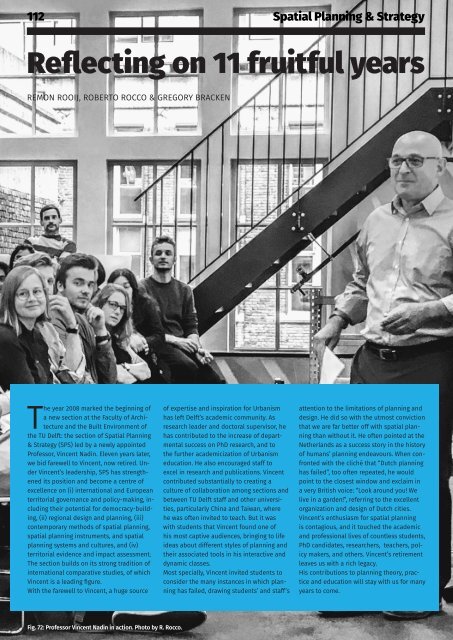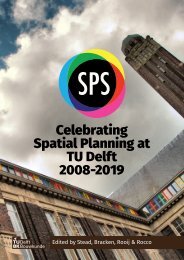*Celebrating Spatial Planning at TU Delft: 2008-2019. Edited by Stead, Bracken, Rooij & Rocco
This is a summary of the achievements of the session Spatial Planning & Strategy of the Department of Urbanism, Faculty of Architecture and the Built Environment, TU Delft, led by Professor Vincent Nadin between 2008 and 2019.
This is a summary of the achievements of the session Spatial Planning & Strategy of the Department of Urbanism, Faculty of Architecture and the Built Environment, TU Delft, led by Professor Vincent Nadin between 2008 and 2019.
Create successful ePaper yourself
Turn your PDF publications into a flip-book with our unique Google optimized e-Paper software.
112 <strong>Sp<strong>at</strong>ial</strong> <strong>Planning</strong> & Str<strong>at</strong>egy<br />
Reflecting on 11 fruitful years<br />
REMON ROOIJ, ROBERTO ROCCO & GREGORY BRACKEN<br />
The year <strong>2008</strong> marked the beginning of<br />
a new section <strong>at</strong> the Faculty of Architecture<br />
and the Built Environment of<br />
the <strong>TU</strong> <strong>Delft</strong>: the section of <strong>Sp<strong>at</strong>ial</strong> <strong>Planning</strong><br />
& Str<strong>at</strong>egy (SPS) led <strong>by</strong> a newly appointed<br />
Professor, Vincent Nadin. Eleven years l<strong>at</strong>er,<br />
we bid farewell to Vincent, now retired. Under<br />
Vincent’s leadership, SPS has strengthened<br />
its position and become a centre of<br />
excellence on (i) intern<strong>at</strong>ional and European<br />
territorial governance and policy-making, including<br />
their potential for democracy-building,<br />
(ii) regional design and planning, (iii)<br />
contemporary methods of sp<strong>at</strong>ial planning,<br />
sp<strong>at</strong>ial planning instruments, and sp<strong>at</strong>ial<br />
planning systems and cultures, and (iv)<br />
territorial evidence and impact assessment.<br />
The section builds on its strong tradition of<br />
intern<strong>at</strong>ional compar<strong>at</strong>ive studies, of which<br />
Vincent is a leading figure.<br />
With the farewell to Vincent, a huge source<br />
of expertise and inspir<strong>at</strong>ion for Urbanism<br />
has left <strong>Delft</strong>’s academic community. As<br />
research leader and doctoral supervisor, he<br />
has contributed to the increase of departmental<br />
success on PhD research, and to<br />
the further academiciz<strong>at</strong>ion of Urbanism<br />
educ<strong>at</strong>ion. He also encouraged staff to<br />
excel in research and public<strong>at</strong>ions. Vincent<br />
contributed substantially to cre<strong>at</strong>ing a<br />
culture of collabor<strong>at</strong>ion among sections and<br />
between <strong>TU</strong> <strong>Delft</strong> staff and other universities,<br />
particularly China and Taiwan, where<br />
he was often invited to teach. But it was<br />
with students th<strong>at</strong> Vincent found one of<br />
his most captive audiences, bringing to life<br />
ideas about different styles of planning and<br />
their associ<strong>at</strong>ed tools in his interactive and<br />
dynamic classes.<br />
Most specially, Vincent invited students to<br />
consider the many instances in which planning<br />
has failed, drawing students’ and staff’s<br />
<strong>at</strong>tention to the limit<strong>at</strong>ions of planning and<br />
design. He did so with the utmost conviction<br />
th<strong>at</strong> we are far better off with sp<strong>at</strong>ial planning<br />
than without it. He often pointed <strong>at</strong> the<br />
Netherlands as a success story in the history<br />
of humans’ planning endeavours. When confronted<br />
with the cliché th<strong>at</strong> “Dutch planning<br />
has failed”, too often repe<strong>at</strong>ed, he would<br />
point to the closest window and exclaim in<br />
a very British voice: “Look around you! We<br />
live in a garden!”, referring to the excellent<br />
organiz<strong>at</strong>ion and design of Dutch cities.<br />
Vincent’s enthusiasm for sp<strong>at</strong>ial planning<br />
is contagious, and it touched the academic<br />
and professional lives of countless students,<br />
PhD candid<strong>at</strong>es, researchers, teachers, policy<br />
makers, and others. Vincent’s retirement<br />
leaves us with a rich legacy.<br />
His contributions to planning theory, practice<br />
and educ<strong>at</strong>ion will stay with us for many<br />
years to come.<br />
Fig. 72: Professor Vincent Nadin in action. Photo <strong>by</strong> R. <strong>Rocco</strong>.




